The recent release of TheGenealogist’s AIR 27 Operations Record Books (ORBs) includes some fascinating records for air force squadrons of WW2. These documents chronicle the wartime aircrew who served in units of the RAF as well as some of the dominion and Allied Air Force squadrons under British Command. Fighter squadrons as well as those from Bomber Command are to be found in this collection and because they are fully searchable by name on TheGenealogist we can use the ORBs to follow the missions that our aircrew ancestors flew.
In the latest batch we are able to find the famous air ace Douglas Bader, from before the war, as he is posted from RAF Kenley to RAF Uxbridge in December 1931. The compiler of the diary reports that Pilot Officer D.R.S. Bader was “Supernumerary Non-effective. Sick as a result of Flying Accident at Woodley Aerodrome on 14.12.31”. The report does not elaborate that this was the date of the crash that saw Bader lose both his legs when he was attempting some aerobatics and so this was why he was noted as sick. After recovering from his accident Bader retook his flight training and passed, going on to take part in the 1932 Hendon airshow with a Gloster Gamecock.
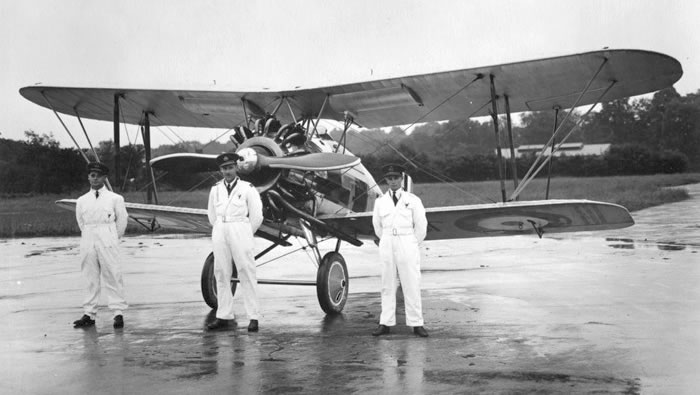
The photograph above shows him in front of the aircraft while training for this event. The RAF, however, then retired him against his wishes in May 1933 on the grounds that this situation was not covered by King’s Regulations. With the outbreak of war, however, Bader was able to rejoin the RAF in 1939. As you would expect there are a number of other mentions of the famous fighter pilot as, against all odds, he returned to flying duties when war broke out.
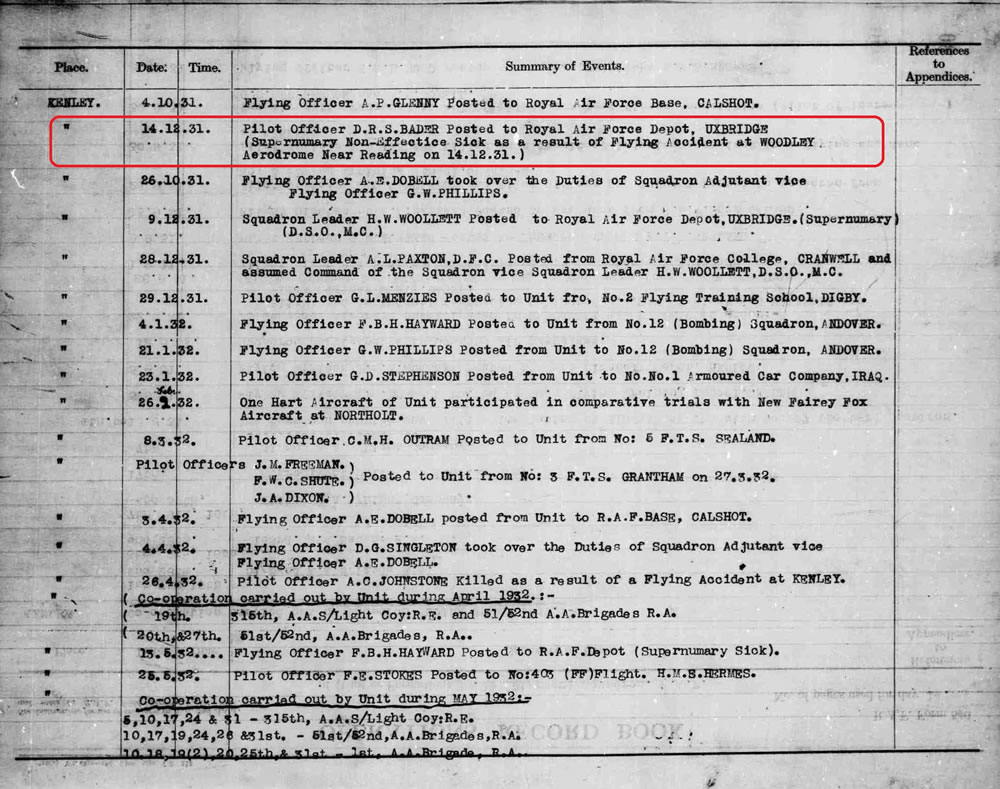
If you are following the path of an airman ancestor via these documents you will often be able to see when they were awarded a medal or posted to a new unit. Of the several mentions for Douglas Bader in the ORBs for 242 Squadron in the Second World War is the one for 14 September 1940 where, tagged onto the day’s entry reporting about the wing being on patrol over London “Nothing seen, but jolly cold” a pilot crashing because of an unknown oxygen problem and then the unit’s second patrol of the day off Kent “still no enemy aircraft seen” we can also read that S/Ldr. Bader was awarded D.S.O. and F/ Lt. Ball the D.F.C.
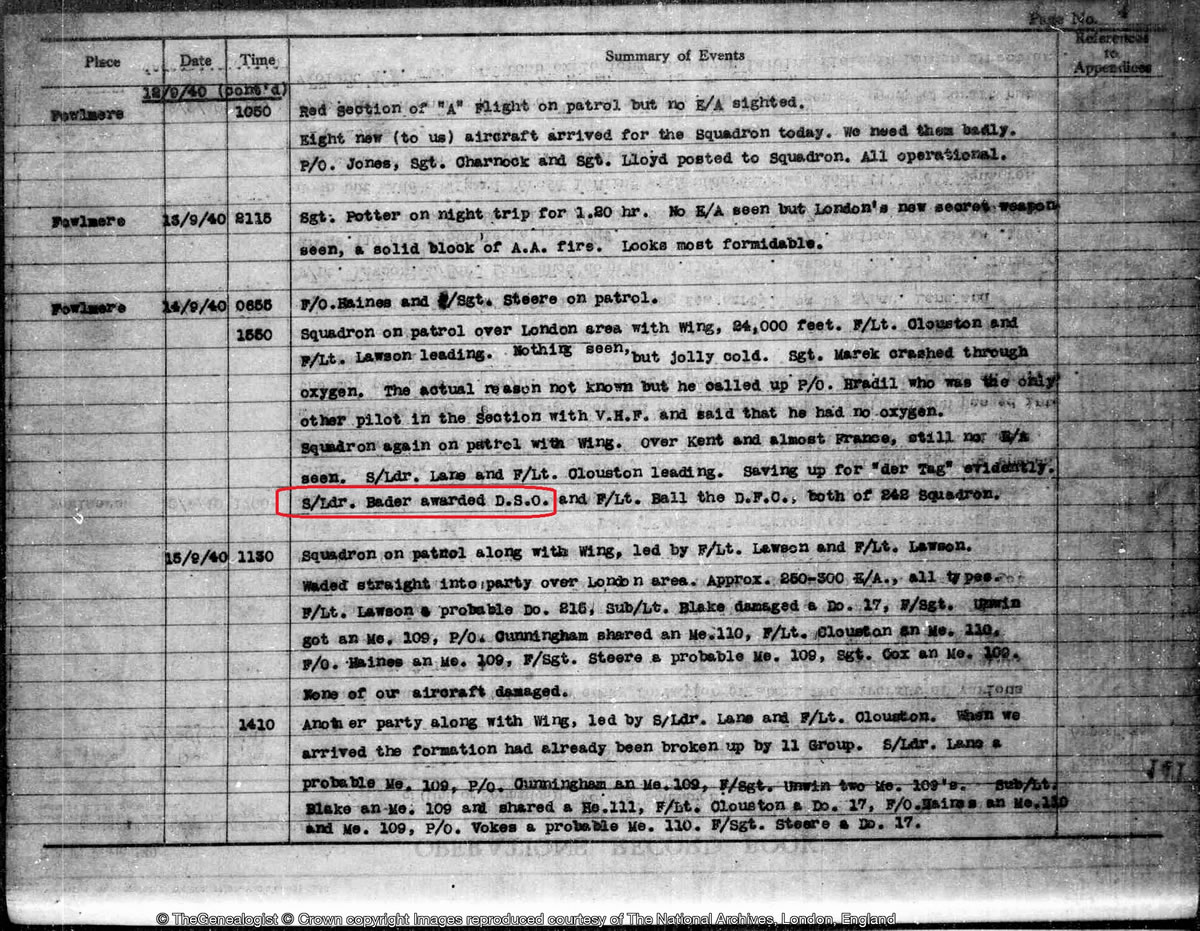
Bomber Command
While the fighter pilots often get the glory in so many of the reports that we read in the history of the conflict, we are also able to find in these ORB records the airmen who served in the RAF’s Bomber Command. The various bomber units played a central role in the strategic bombing of Germany in World War II and included crew from the Commonwealth and other allied countries, as well as those from Britain. The ages of the aircrew who went on the raids were mostly between 19 and 25 years old, although some were known to be as young as 16, and at least one man was in his sixties.
Access Over a Billion Records
Try a four-month Diamond subscription and we’ll apply a lifetime discount making it just £44.95 (standard price £64.95). You’ll gain access to all of our exclusive record collections and unique search tools (Along with Censuses, BMDs, Wills and more), providing you with the best resources online to discover your family history story.
We’ll also give you a free 12-month subscription to Discover Your Ancestors online magazine (worth £24.99), so you can read more great Family History research articles like this!
Bomber Command aircrews suffered a high casualty rate with a 46 percent death rate. A total of 57,205 were killed, a further 8,403 men were wounded in action and 9,838 became prisoners of war. Despite this, some experienced airmen carried out repeated operations at their own request, and several are recorded to have flown 100–120 operations. One of those brave men was Squadron Leader Daniel Trevor Bulmer “Danny” Everett, DFC and 2 Bars who is believed to have flown more than 120 operations before being killed in action on 7 March 1945 flying with No. 35 Squadron RAF.
The Operations Record Book for that day for Squadron 35 records that his “aircraft is missing, nothing being heard from it after take off.” These simple and unemotional words chronicle the failure to return of a pilot and the seven other members of his crew whose luck had finally run out.
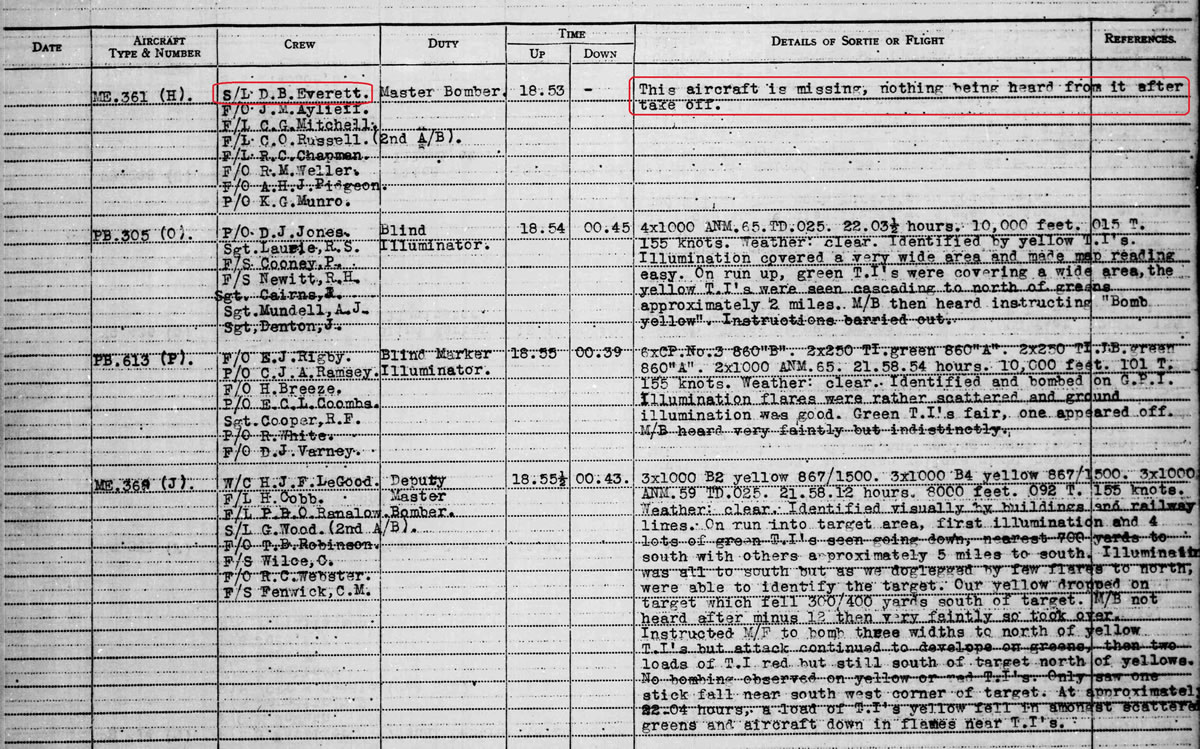
Everett had enlisted in the Royal Air Force Volunteer Reserve around May 1940. He trained to fly firstly with the rank of Sergeant and in July 1942 joined the heavy bombers. He was then commissioned as a Pilot Officer on 29 May 1943 and joined No. 35 Squadron RAF, Pathfinder Force at RAF Graveley.
Pathfinders were a group of highly experienced squadron and flight commanders supported by several highly experienced pilots, navigators and bomb aimers. The Pathfinders aimed to improve the accuracy of bombing by flying a little ahead of the main force and dropping marker flares known as “target indicators” directly on to the target which were used as an aiming point by lesser experienced crews following behind them.
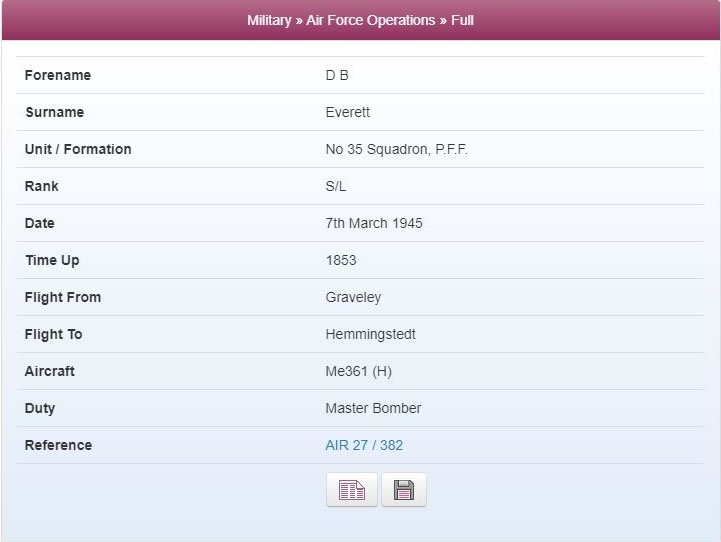
Wikipedia’s entry for Daniel Everett explains that he was ‘ordered to take a rest from operations but continued to look for opportunities to fly and on 7 March 1945 gathered a “scratch crew” of senior airmen for a spare Avro Lancaster aircraft, serial number “ME361”, to lead 256 Halifaxes and 25 Lancasters of Nos. 4, 6 and 8 Groups to attack the Deutsche Erdöl-Aktiengesellschaft oil refinery at Hemmingstedt, near Heide. Everett took off at 18:53 hours from RAF Graveley as Master Bomber. His aircraft was shot down at about 22:00 hours in the target area apparently hit by flak. The claim for a Lancaster shot down was submitted by Luftwaffe 3, Flak-Division. Everett and his entire crew of eight were killed, they were buried by the Germans at Hemmingstedt but later moved to the Commonwealth War Graves Commission war cemetery at Hamburg.’(https://en.wikipedia.org/wiki/Daniel_Everett_(RAF_officer) )
These Royal Air Force Operations Record Books documents recount the stories of the wartime aircrews who served their country and give great insights into their everyday lives in the air force. Researchers are able to use the collection to follow an airman’s war time experiences as TheGenealogist has made the ORBs fully searchable.







